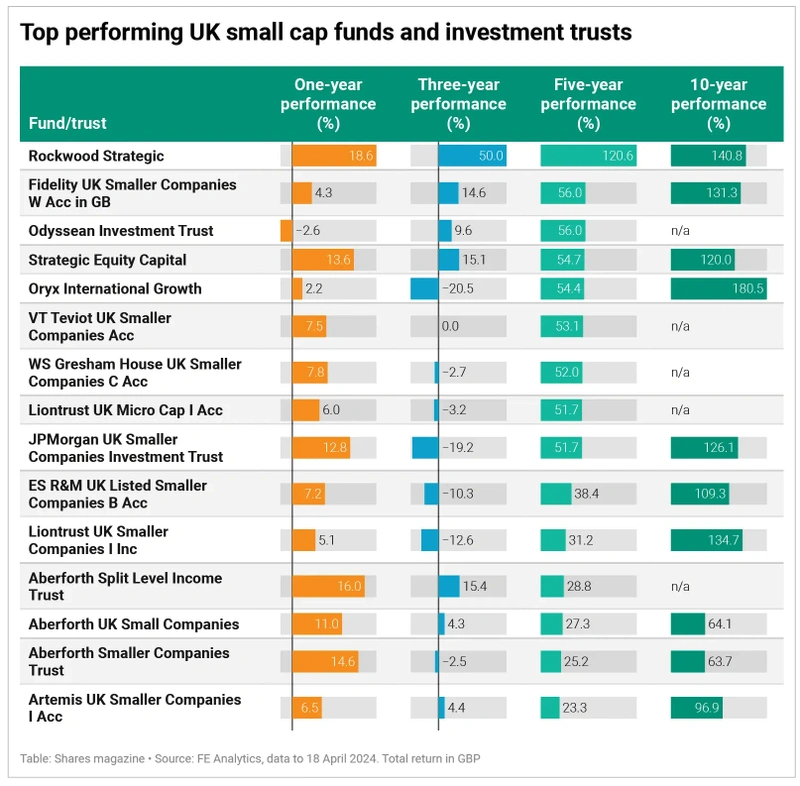Tap into micro caps for a slice of UK innovation

A key rationale for investing in the smallest companies on the UK market is that these businesses have the most capacity for growth.
However, for several reasons investing in micro-cap businesses is not for everyone and has, with some notable exceptions, proved less than fruitful in recent years.
WHAT IS A MICRO CAP?
The definition of what constitutes a micro cap varies. Natalie Bell, fund manager at the Liontrust Economic Advantage team defines a micro cap as being a company with a market cap under £275 million.
The MSCI UK Micro Cap Index which focuses on this sector includes 400 companies of which the largest (as of 29 March 2024) has a market valuation of £430 million. The mean average size is around £96 million.
Ryan Lightfoot-Aminoff, analyst at Kepler Trust Intelligence says: ‘There are several investment trusts that focus on primarily on micro caps which typically invest below this. They invest from as low as circa £20 million market cap up to a maximum of £150 million at the time of initial investment, though often holdings are allowed to grow if the investment thesis holds.’
Chris McVey, co-manager of the FP Octopus UK Micro Cap Growth Fund (BYQ7HN4) told Shares: ‘UK smaller companies are the forgotten growth market with the FTSE Small Cap Index, and FTSE AIM Index, offering similar earnings growth dynamics to Nasdaq, well ahead of the FTSE 100, yet trading at half the US peers’ earnings multiple. This valuation disconnect will not sustain. We are excited about the prospect for significant returns from current levels for UK growth equities as interest rate conditions normalise and the economy pushes forward.’
HOW TO INVEST IN MICROCAPS
There are several ways to invest in microcaps either buying a single stock, an investment trust or fund focused on the micro-cap sector.
The FP Octopus UK Micro Cap Growth Fund and FP Octopus UK Multi Cap Income Fund (BG47Q55) are two examples.
The FP Octopus UK Multi Cap Income Fund has beaten its benchmark – Investment Association UK Equity Income – since launch in 2019, delivering returns of 43% to investors (cumulative performance to 29 February 2024) versus 29.2% from its benchmark. Holdings include wholesaler Kitwave (KITW:AIM).
Kitwave has had a steady stream of upgrades following its IPO in 2021 which has helped propel its shares up by more than 100%.
From a dividend per share of 9.3p for the year to October 2022, the group is forecast to deliver a dividend this current financial year of 12.3p, equating to a yield of almost 4%, and income growth of over 36% in the period.
FP Octopus UK Micro Cap Growth aims to achieve capital growth by investing in a portfolio of between 60 and 100 growing smaller companies.
Since launch (31 August 2007) the fund has returned a return of 158.9% and over five years 15.5%.
ADVANTAGES OF MICRO CAP INVESTING
One of the main advantages of investing in micro caps is that the investor is investing in small businesses which are flexible and can adapt to challenging market conditions, whereas larger organisations are slower to change.
Smaller companies also have quite flat management structures and can problem solve and come up with solutions quicker. The smaller the company, the more focused they are on a product or service.
Gervais Williams, fund manager at Miton UK MicroCap Trust (MINI) says: ‘There are two main reasons for investing in micro caps. First, being immature, when they succeed, they sometimes go on succeeding for a series of years. They often start off at sub-normal valuations, and as they expand, they sometimes get lucky and grow even more rapidly than expected. The net effect is that some micro caps have the potential to deliver a multiple of the original share price.
‘Second, when they succeed, their market capitalisation rises so that they become of interest to a wider group of professional investors. At this point, investors often get quite excited about its prospects, and can sometimes drive up its market valuation.’
The largest holding in the Miton UK Microcap Trust is currently Yu Group (YU.: AIM). The trust started buying the holding when its shares traded was between 70.6p and 80.5p in August 2020. As of 28 March 2024, its share price was £18.
‘Overall, in the micro-cap investment universe it is possible to sometimes invest in an exciting growth stock, at a valuation which ticks the value box, in a business model that is in our view quality.’
DISADVANTAGES OF MICROCAP INVESTING
Although micro-cap stocks can offer investors an opportunity to get into some of the most exciting growth companies in the UK at an early stage, they do come with certain risks which need navigating.
‘These include lower liquidity, higher price volatility, hype-driven price cycles (also known as market bubbles, which can frequently occur in the shares of single stocks) and lower standards of corporate governance,’ says Liontrust’s Natalie Bell.
Bell adds that micro caps are also not the traditional hunting ground for yield hungry investors: ‘A company paying a dividend is generally a sign of maturity and financial stability, and therefore not naturally associated with micro caps. These are typically younger firms focused primarily on growth rather than distributing profits via dividends.
‘More generally within the micro-cap universe of 832 companies, only 27% pay a dividend, and among these dividend-paying micro caps, only 12% offer a yield that surpasses the yield on a two-year gilt (currently 4% according to US data firm Bloomberg).’
Important information:
These articles are provided by Shares magazine which is published by AJ Bell Media, a part of AJ Bell. Shares is not written by AJ Bell.
Shares is provided for your general information and use and is not a personal recommendation to invest. It is not intended to be relied upon by you in making or not making any investment decisions. The investments referred to in these articles will not be suitable for all investors. If in doubt please seek appropriate independent financial advice.
Investors acting on the information in these articles do so at their own risk and AJ Bell Media and its staff do not accept liability for losses suffered by investors as a result of their investment decisions.
Issue contents
Daniel Coatsworth
Feature
- Tap into micro caps for a slice of UK innovation
- Chinese manufacturing PMI data needs to be closely watched
- Emerging markets: China rebound, Indian elections and valuations
- Small World: read about Gresham Technologies, T Clarke, REDX Pharma and more
- Are corporate spin-offs a good hunting ground for profitable investments?
- Dividend Machines
- Why Darktrace is getting exciting again
Great Ideas
Investment Trusts
News
- Ocado shares wobble after M&S relationship turns sour
- United Airlines soars on upgrades despite Boeing-related hit
- Retail sales not as bad as reported, while consumer confidence rises slowly
- Warnings from chip giants cast doubt over semiconductor optimism
- FTSE 100 finally joins the new-highs club despite being unloved for years

 magazine
magazine









